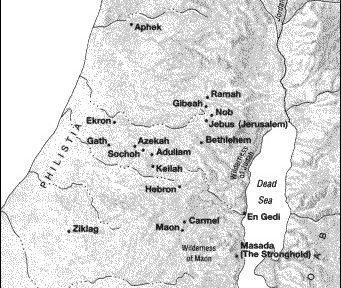Today it is my goal to finish Judges with another strange story. I wonder when people read the newspaper two-hundred years from now if it will sound like this.
Today it is my goal to finish Judges with another strange story. I wonder when people read the newspaper two-hundred years from now if it will sound like this.
The book of Judges ends with the logical conclusion to the way it began, that is disobedience, life without a ruler, doing what was right in their own eyes. The last two chapters presented personal idolatry becoming national idolatry. This also sounds like the State of the Union address last night. These next three chapters present another Levite, more civil unrest, and the close annihilation of a tribe. It all began with a family squabble with another family residing in Ephraim (Samaria). It seems as though this is the beginning of a horror movie. Read Judges 19.1-21 in light of that because what follows is horrific. This is what happens when man is left to himself.
The Levite’s concubine, think a wife here, leaves her husband and goes home to Bethlehem because of she was angry. He loves her, chases her, and desires to bring her back home. After some time with her family, they return home. Instead of staying the night in Jebus (later called Jerusalem) because it is populated by the Jebusites, they travel onto a safer city, one that is populated by Israelites.
They arrive in Gibeah, of the tribe of Benjamin. The people show no hospitality, which is a sin. Late into the evening an old man puts them up for the night. This is the setting.
The nation of Israel, at least this group of Benjamites, is practicing homosexuals and ones who wantonly rape male travelers. I will have to research this portion of the Old Testament a bit more because it is, on the surface, hard to explain. The men of the city attack the man’s house in order to rape the Levite. The man would have nothing to do with this. Instead, he offers his virgin daughter and the concubine for the men to rape. This also happened at Sodom and Gomorrah. The men did not want the women but clamored for the Levite. The Levite threw his concubine, think a slave here, to the men who abused her through the night so much so that she died in the morning.
The Levite carried her home, butchers her into twelve pieces, to represent the twelve tribes, and mailed a piece of her to each tribe with a threat.
Chapter 20 describes a sorrowful Israel bringing justice upon the Benjamites. The attempt was to discipline and purge the nation of the sin that was committed in Gibeah. God says to destroy such people from the nation of Israel. What would have happened if the church was living out what God had called her to live out during the last century? Would our nation be different? I believe so. We, the church, are at fault for not standing on God’s Word, doing what He has called us to do. I am not stating that we should have killed all homosexuals. I am stating that if we established orphanages, reached out to homeless, widows, impoverished (Matthew 24-25), that when the time of the sexual revolution began, the voice of the church would have been honored.
Back to Judges 20. Instead of punishing the men who committed the crime, the Benjamites thought it better to go to war against their brothers. Four hundred thousand men fighting against one tribe. Benjamin loses. During this horrific time, the other tribes kept going to God asking Him what to do. In order to discipline and purge, He commanded they keep fighting. Only six-hundred men survived.
Chapter 21 is the ultimate in dating. Since no one who fought could give wives to the surviving men, the tribe of Benjamin would no longer exist. One city did not fight. Because of this, they were to be killed (another item to research). Since they had four-hundred virgins there, these would survive and they could be given to the six-hundred Benjamites. Doing the math, there are two-hundred more men than women.
The plan was to send the remaining uncoupled men to Shiloh to “kidnap” a wife for themselves. This way the tribes would be blameless because they did not give the daughters to them. So, the Benjamites survived.
The telling verse is verse twenty-five: “In those days there was no king in Israel; all the people did what was right in their own eyes.” When I read this, I read the people did not desire God, so they did what they thought was right, which led to destruction.
There is a way that seems right to a man, but in the end it leads to destruction (Proverbs 14.12). What path is our nation, our family, yourself taking right now?
Tomorrow Ruth.


